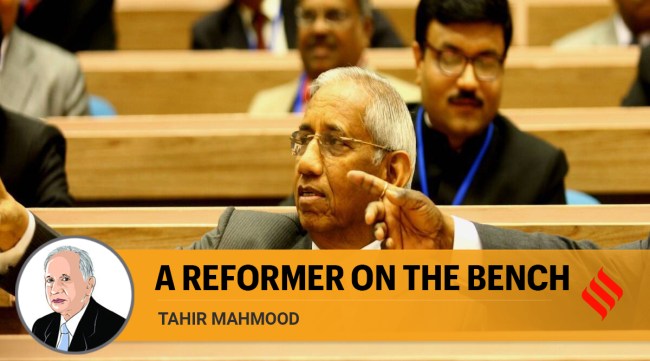Opinion R C Lahoti’s valuable contribution to Muslim personal law reform
Tahir Mahmood writes: The former Chief Justice of India’s rulings struck a blow to the traditional understanding of the rules of talaq under Muslim law, and also corrected the grave misconceptions about its stand on bigamy
 Former Chief Justice of India RC Lahoti
Former Chief Justice of India RC Lahoti If any former CJI other than the Shah Bano architect, the late Y V Chandrachud, will be remembered by posterity for contribution to Muslim personal law reform in India it is Ramesh Chandra Lahoti who breathed his last on Wednesday. He had joined the apex court bench in 1998 and at the beginning of the new millennium pronounced judgments on two controversial issues in Muslim law — divorce and bigamy. This led to the judicial restoration of the true scriptural law by blowing away the cobwebs from several confused brains. Miles ahead of the Shah Bano verdict of 1985 which had fine-tuned only the law on Muslim women’s post-divorce rights, Lahoti’s rulings struck a blow to the traditional understanding of the rules of talaq under Muslim law, and also corrected the grave misconceptions about its stand on bigamy.
There has been an abominable practice in India under which when a deserted Muslim wife, after long years of waiting for reconciliation, approaches a court to seek financial relief, the unscrupulous husband tries to defeat her rightful claim by pretending to have quietly divorced her sometime in the past. In many old cases during colonial rule, the courts had accepted such a plea and denied relief to aggrieved wives. These precedents were followed by some high courts also after Independence. Deciding an appeal in one such case (Shamim Ara vs State of UP, 2002), Lahoti confidently held that under Muslim law there is a proper procedure for talaq and that unless the husband proves meticulous compliance with the prescribed procedure, his claim of having divorced the wife cannot be accepted.
“We are very clear in our mind that a mere plea taken in the written statement of a divorce having been pronounced sometime in the past cannot by itself be treated as effectuating talaq,” Lahoti ruled. “There are no reasons substantiated in the justification of talaq and no plea or proof that any effort at reconciliation preceded the talaq,” he said and declared that in the case before him neither had the marriage been dissolved nor had the husband’s financial liabilities towards his lawfully wedded wife come to an end.
The celebrated judgment in the case marked the beginning of the judicial restoration of the true Muslim law on divorce in India. Lahoti threw into the dustbin of history the practice of Muslim husbands using a divorce plea as an afterthought in their wives’ legal cases desperately seeking relief. Honouring me by citing my scathing critique of past judicial decisions in which a mere statement by a married man that he had divorced his wife was accepted by the courts, the learned judge overruled all such precedents. This was the ruling which ultimately led to the apex court’s constitution bench decision in the Shayara Bano case of 2017 setting aside the practice of the so-called triple talaq (followed by legislation outlawing it). One of the five judges on the Shayara Bano bench, Kurian Joseph asserted: “I expressly endorse and re-iterate the law declared in Shamim Ara.”
An unconditional permission for polygamy is erroneously believed by sections of common Muslims to be a part of their religion and personal law. Under this mistaken impression, they think that having children from each of the multiple wives should also be deemed a religious privilege. Any general law of the country which even in the remotest way curtails their alleged “freedoms” in these matters is seen by them as contrary to their personal law of professedly divine origin, and they seek exemption from it.
A Haryana state law of 1994 had laid down that gram panchayats members having more than two children will be ineligible to seek election to the zila parishad. The restriction was meant to promote smaller families and planned parenthood. An aspiring Muslim contestant pleaded that having multiple children was a natural corollary to the freedom for polygamy under Muslim personal law. Challenging the state law under the religious freedom clause of the Constitution, he sought exclusion from the two-children norm. Deciding his appeal, Lahoti rejected the foolish plea (Javed vs Haryana State, 2003). “No religious scripture or authority has been brought to our notice which provides that marrying less than four women or abstaining from procreating a child from each and every wife in case of permitted bigamy or polygamy would be irreligious or offensive to the dictates of the religion,” he declared and upheld the constitutional validity of the Haryana law.
The learned judge was absolutely right. The Quran had not enjoined or even encouraged polygamy. It had just allowed it, with a “better not” caution, to be resorted to in special circumstances and subject to rather insurmountable restrictions. And, certainly, there is no religious injunction under Muslim law making it mandatory for the polygamists to have children from all wives.
Lahoti immortalised himself by crafting these commendable rulings into the Muslim family jurisprudence of India. He will remain alive in the hearts of social reformers of the country and true well-wishers of the community.
This column first appeared in the print edition on March 26, 2022 under the title ‘A reformer on the bench’. The writer is a professor of law and ex-member, Law Commission of India







